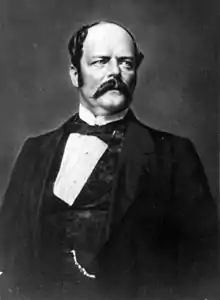Lewis Washington
Lewis William Washington (November 30, 1812 – October 1, 1871)[1][2] was a great-grandnephew of President George Washington, who is principally remembered as a hostage of abolitionist John Brown's raid on Harpers Ferry, Virginia and as a prosecution witness in the subsequent trial of Brown.
Lewis Washington | |
|---|---|
 | |
| Born | November 30, 1812 |
| Died | October 1, 1871 (aged 58) |
| Parent(s) | George Corbin Washington Elizabeth Beall |
| Relatives | George Washington (great-granduncle) William Augustine Washington (grandfather) Augustine Washington (great-grandfather) |
Lewis Washington was the son of George Corbin Washington, the grandson of William Augustine Washington, and a great-grandson of Augustine Washington, half-brother of George Washington.[3] Lewis Washington inherited Beall-Air near Halltown, West Virginia through his mother, Elizabeth, daughter of Thomas Beall. He made his home at Beall-Air from 1840 until his death in 1871.[4]
The Harper's Ferry Raid
Lewis William Washington inherited several relics of George Washington, including a sword allegedly given by Frederick the Great to Washington and a pair of pistols given by Lafayette.[5] John Cook, who served as John Brown's advance party at Harpers Ferry, befriended Washington and noted the relics, as well as the slave population at Beall-Air. Brown was fascinated with the Washington relics. During Brown's October 16, 1859 raid on Harpers Ferry a detachment from his force led by Cook seized the sword and pistols along with Washington at Beall-Air, taking along three of Washington's slaves. The hostages were taken to Harpers Ferry by way of the Allstadt House and Ordinary, where more hostages were taken. Ultimately, Washington and the others were held at Brown's base in the fire engine house of the Harpers Ferry federal arsenal. All survived their captivity, and Washington identified Brown to the Marine rescue party. During the assault on John Brown's Fort, a saber thrust by Marine Lieutenant Green at Brown was allegedly deflected by the belt buckle securing the Washington sword.[3]
During John Brown's trial for treason against the Commonwealth of Virginia, Lewis Washington testified as a witness for the prosecution. During cross-examination, Washington testified that Brown treated his hostages well and gave orders not to harm civilians.[6]
When the Civil War began, Washington sided with the Confederacy. On July 17, 1865, he was pardoned by President Andrew Johnson.[7] Many pieces from Lewis Washington's collection of Washington family items, including the sword given him by Frederick the Great and the Lafayette pistols, were donated to the New York State Library by his widow in 1872.[8] Lewis Washington married twice, first to Mary Ann Barroll and then to Ella Bassett.[2] He was survived by two sons and two daughters, James Barroll Washington, who served in the Confederate army,[8] Mary Ann Washington (married to Henry Irving Keyser), Eliza Ridgeley Washington (married Elias Glenn Perine), and William De Hertbrun Washington. [9] William De Hertbrun Washington died without issue on August 30, 1914. James Barroll Washington was survived by one son, William Lanier Washington who died without surviving children on September 11, 1933 after selling the remainder of his family collection of Washington heirlooms at public auction on April 19, 1917.[10]
Children of Lewis William Washington and Mary Ann Barroll:
- George Corbin Washington (1837–1843)
- James Barroll Washington (1839–1899)
- Mary Ann Washington (1841–1931)
- Eliza Ridgeley Washington (1844–1919)
Children of Lewis William Washington and Ella Bassett:
- Betty Lewis Washington (1861–1862)
- William De Hertbrun Washington (1863–1914)
Notes
- Sorley, Merrow Egerton (1935). Lewis of Warner Hall: The History of a Family. Baltimore, Maryland: Genealogical Publishing Company. p. 241. ISBN 9780806308319. Retrieved 2010-08-20.
- "Washington, Lewis William". House Divided, The Civil War Research Engine at Dickinson College. Dickinson College. 2007-09-25. Retrieved 2010-08-20.
Life span 01/01/1808—10/01/1871...Birth Date Certainty: Estimated...Death Date Certainty: Exact
- Ted McGee (April 5, 1973), National Register of Historic Places Nomination: Beall-Air (PDF), National Park Service, archived from the original (PDF) on February 3, 2013
- "Beallair: A Journey Through Time". The Wormald Companies (a developer who currently owns the Beall-Air Estate. Retrieved 2010-08-20.
- "Freedom's Treasures". New York State Education Department : Office of Cultural Education : Cultural Education Center. Archived from the original on 2010-06-17. Retrieved 2010-08-20.
- Linder, Douglas O. (2005). "The Trial of John Brown: A Commentary". University of Missouri-Kansas City, School of Law. Archived from the original on 2010-07-22. Retrieved 2010-08-20.
- Bergeron, editor, Paul H (1990). The papers of Andrew Johnson: May–August 1865. Univ. of Tennessee Press. p. 547. ISBN 0-87049-613-1. Retrieved 2010-08-20.
- Washington, W. Lanier (1916-08-10). "The Sword of Frederick: Tradition in the Washington Family on a Disputed Point" (PDF). The New York Times. pp. E2. Retrieved 2010-08-20.
- "Of Good Old Virginia Blood; William D'Hertburn Washington of Famous Ancestry" (PDF). The New York Times. 1894-02-11. p. 20. Retrieved 2010-08-20.
- Washington, William Lanier (1917). Historical Relics of George Washington Inherited and Collected by Mr. William Lanier Washington: original letters and documents, by George Mason and others on the formation of the Constitution, original unpublished diary of James McHenry, member of the Constitutional convention, and a miniature of Washington, painted by Birch, to be sold Thursday evening, April 19, 1917. Anderson Galleries.
